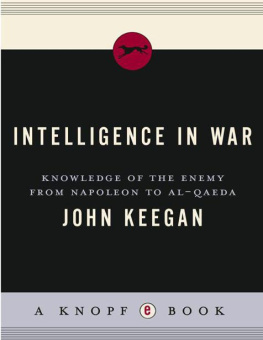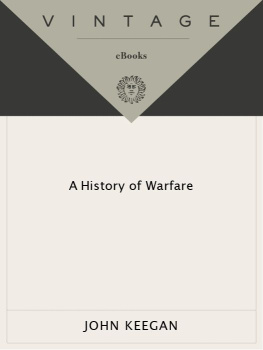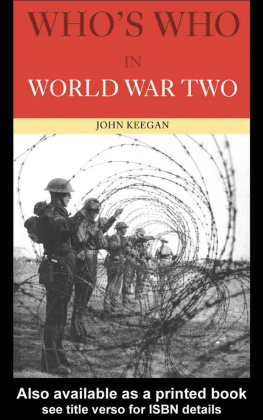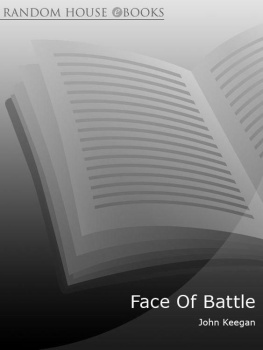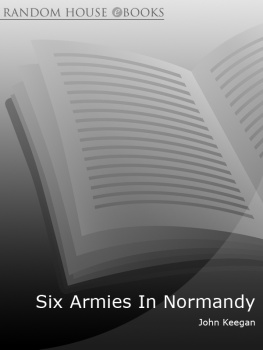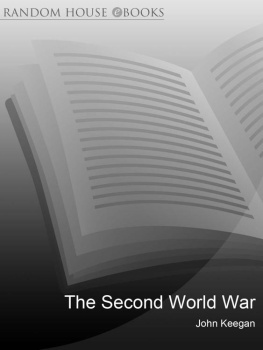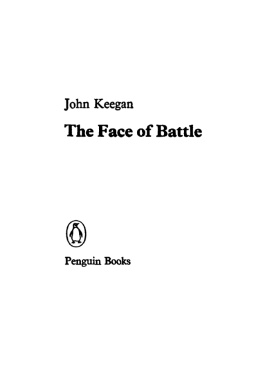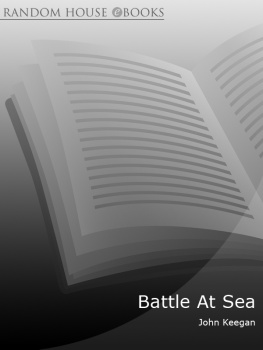
INTELLIGENCE IN WAR
KNOWLEDGE OF THE ENEMY FROM
NAPOLEON TO AL-QAEDA

JOHN KEEGAN

Alfred A. Knopf
New York 2003

CONTENTS
To Rose

ACKNOWLEDGEMENTS
I have tried to steer clear of the intelligence world all my working life. For good reason: As a young lecturer in military history at the Royal Military Academy Sandhurst I was told that any contact with intelligence organisations, those of other countries especially but also our own, would attract official disapproval (I should have answered, but did not, that I possessed no shred of information that could have been of the slightest interest to any sensible intelligence officer). Later, as defence correspondent, then defence editor of The Daily Telegraph, I decided that entanglement with intelligence organisations was unwise, having concluded, by that stage of my life, through reading, conversation and a little personal observation, that anyone who mingled in the intelligence world, in the belief that he could make use of contacts thus made, would more probably be made use of, to his disadvantage. I continue to believe that to be the case.
Nevertheless, and probably inevitably, given my career first in the Ministry of Defence, then as a newspaperman and continuously as a military historian, I have come to know over the years more inhabitants of the intelligence world than I would have deliberately set out to meet. Some of my Sandhurst pupils became intelligence officers; one died, heroically, at the hands of the Irish Republican Army. Some of my Sandhurst colleagues served in Special Forces, which are on intimate terms with the intelligence organisations and often act as their executive arm. Academic life, improbably as it may seem, sometimes brought me into touch with the intelligence services, though, it should be explained, with their analytic rather than operational branches. Fleet Streetwhere the offices of The Daily Telegraph were still located when I joined in 1986had then, and still has, its own informal relations with the intelligence services; at the outset the newspaper encouraged me to get to know what were called the contacts.
The first to whom I was sent was also the most important, the then chairman of the Joint Intelligence Committee, which oversees the work of the Secret Intelligence Service (MI6) and the Security Service (MI5), dealing respectively in foreign and domestic intelligence. It was arranged that I should meet him in one of Londons grand gentlemens clubs. I was not told how I should recognise him. I remembered, however, from the novels of John le Carrsomeone with whom Fleet Street would also bring me into touchthat a good agent always sits in the corner of the room from which he can see the entrance and has access to two separate exits. On arriving, I spotted the chairman instantly.
I later met the head of MI6 and, much later still, the then head of MI5, (Dame) Stella Rimington; I have no hesitation in mentioning her name since, to the outrage of some of her colleagues, she insisted in retirement on publishing her memoirs. I met her in the company of my then editor and great friend, Max Hastings, who had invited me to join them for dinner, perhaps to assure her that the occasion was purely social and not an attempt on his part to extract information. In the event I had a strong feeling of playing gooseberry; I certainly took little part in the conversation. A few days later an outraged Max cornered me in the office. Do you know what a friend has just told me? The morning after our dinner with Stella she posted the gist of what we discussed on the Whitehall e-mail. Can you credit it? My memories of civil service thought processes came to the fore. All too easily, I said, she was getting her retaliation in first. Government servants are terrified of accusations of treating with the enemy.
I found the American intelligence services altogether more human. At an academic conference I bumped into a genial character who knew my work as a military historian and asked what aspect of it I enjoyed most. Order of battle analysis, I replied unhesitatingly; the order of battle is the list of units involved in an operation, often surprisingly difficult to establish. Really, he said. A little while later I got a message from him to say that he was responsible for training American government servants to whom order of battle was a matter of great importance. Could I come to Washington to give a lecture on the subject?
Washington turned out to be Langley, Virginia, and the government servants in question were trainee analysts of the Central Intelligence Agency; analysts process the information which is assembled by the Agencys other branch, its field officers. My first lecture was a success. Invited to give it a second time, I found myself delivered to CIA headquarters and put into the hands of an escorting officer. I was impressed by the Agencys attention to detail. Youll need a pass, my escorting officer said and put before me a sheet of paper for signature. It contained more personal information about myself than I could have readily assembled. Were going to see the Director, he said, but not yet. Lets have a cup of coffee. He took me round the corner. The husband and wife running the coffee stall were blind.
Now were going to the Directors office. He set off confidently, first one floor, than another. I sensed a loss of confidence. After a bit he stopped to question a passer-by. Wrong floor, he said, with a touch of embarrassment. Eventually arrivedall doors looked identical and had minuscule nameplates below eye levelwe entered an anteroom full of muscular young men with bulges near their armpits. The Director is expecting you, one said.
I entered the adjoining room. A very large man, who I subsequently learned was William Casey, Director of Central Intelligence, indicated a seat and began to speak. I had by this stage formed the impression, by intuition alone, that the CIA wished to communicate with The Daily Telegraph; the trouble was I could not discern quite what. I shuffled my chair nearer Mr. Caseys desk. He continued to speak, unintelligibly. I shuffled nearer. Eventually it dawned on me that the Director was not talking about current intelligence affairs but military history; he was a reader of my books and wanted to discuss technique, as he wrote himself. It was still difficult to understand what he was saying.
Eventually, and clearly as a sign that time was up, he rose from his desk, extracted a book from a shelf, wrote in it and said goodbye. The book turned out to be Where and How the War Was Fought, a surprisingly gripping account of the War of the Revolution related in terms of its geography; the warm inscription stated that my books had been of use to him in composing his. Slightly bemused, I returned to the corridor. My escorting officer was there and so were several other senior CIA agents. What did he say? was their collective question. I couldnt really understand, I answered. There was a collective burst of laughter. I had said the right thing. I later learned that the Director was known as Mumbles and described as the only man in government who doesnt need a secure telephone.
The last encounter with the intelligence world I shall mention was more complex and perhaps more sinister, though I would mislead if I implied that it was really dangerous. During the nineteen-eighties I formed a connection with the American magazine
Next page
